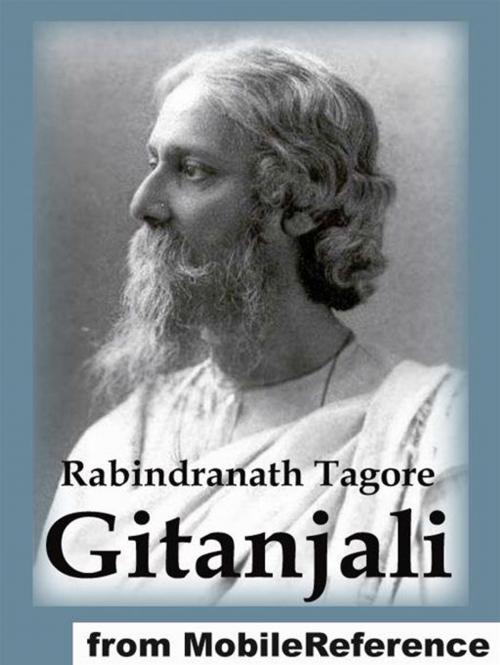| Author: | Rabindranath Tagore | ISBN: | 9781607782582 |
| Publisher: | MobileReference | Publication: | January 1, 2010 |
| Imprint: | MobileReference | Language: | English |
| Author: | Rabindranath Tagore |
| ISBN: | 9781607782582 |
| Publisher: | MobileReference |
| Publication: | January 1, 2010 |
| Imprint: | MobileReference |
| Language: | English |
Gitanjali (Bangla Gitanjoli) is a collection of 103 English poems, largely translations, by the Bengali poet Rabindranath Tagore. This volume became very famous in the West, and was widely translated.Gitanjali (Gitanjoli) is also the title of an earlier Bengali volume (1910) of mostly devotional songs. The word gitanjoli is composed from "git", song, and "anjoli", offering, and thus means - "An offering of songs"; but the word for offering, anjoli, has a strong devotional connotation, so the title may also be interpreted as "prayer offering of song".The English collection is not a translation of poems from the Bengali volume of the same name. While half the poems (52 out of 103) in the English text were selected from the Bengali volume, others were taken from these works (given with year and number of songs selected for the English text): Gitimallo (1914,17), Noibeddo (1901,15), Khea (1906,11) and a handful from other works. The translations were often radical, leaving out or altering large chunks of the poem and in one instance even fusing two separate poems (song 95, which unifies songs 89,90 of naivedya).The translations were undertaken prior to a visit to England in 1912, where the poems were extremely well received. A slender volume was published in 1913, with an exhilarating preface by W. B. Yeats. In the same year, based on a corpus of three thin translations, Rabindranath became the first non-European to win the Nobel prize.-- Excerpted from Wikipedia, the free encyclopedia.
Gitanjali (Bangla Gitanjoli) is a collection of 103 English poems, largely translations, by the Bengali poet Rabindranath Tagore. This volume became very famous in the West, and was widely translated.Gitanjali (Gitanjoli) is also the title of an earlier Bengali volume (1910) of mostly devotional songs. The word gitanjoli is composed from "git", song, and "anjoli", offering, and thus means - "An offering of songs"; but the word for offering, anjoli, has a strong devotional connotation, so the title may also be interpreted as "prayer offering of song".The English collection is not a translation of poems from the Bengali volume of the same name. While half the poems (52 out of 103) in the English text were selected from the Bengali volume, others were taken from these works (given with year and number of songs selected for the English text): Gitimallo (1914,17), Noibeddo (1901,15), Khea (1906,11) and a handful from other works. The translations were often radical, leaving out or altering large chunks of the poem and in one instance even fusing two separate poems (song 95, which unifies songs 89,90 of naivedya).The translations were undertaken prior to a visit to England in 1912, where the poems were extremely well received. A slender volume was published in 1913, with an exhilarating preface by W. B. Yeats. In the same year, based on a corpus of three thin translations, Rabindranath became the first non-European to win the Nobel prize.-- Excerpted from Wikipedia, the free encyclopedia.















